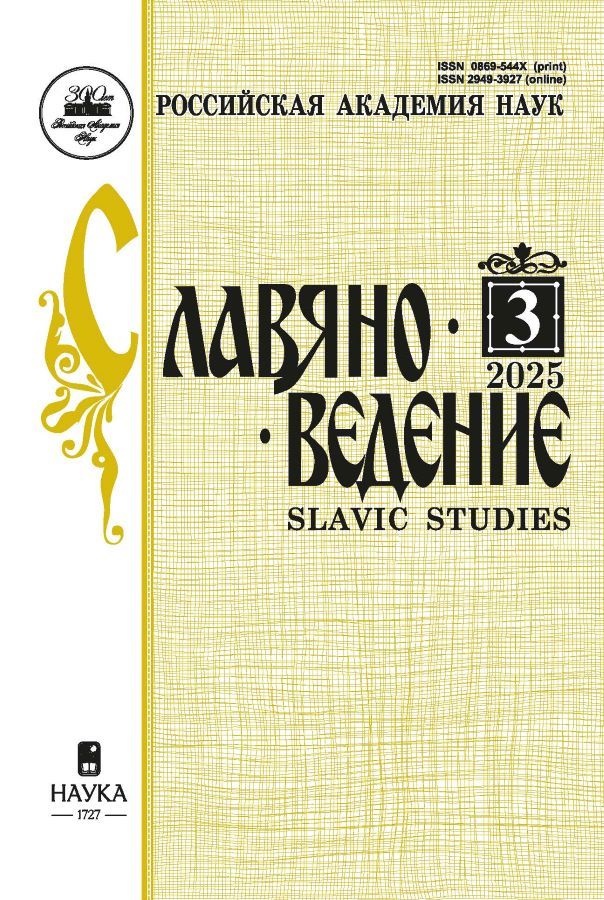Connotative Meanings of ‘White’ in the Lower Mythology of the Slavs in the Light of the Etymology of Proto-Slavic *běl-
- Authors: Agapkina T.A.1
-
Affiliations:
- Institute of Slavic Studies Russian Academy of Sciences
- Issue: No 1 (2025)
- Pages: 72-85
- Section: Articles
- URL: https://ruspoj.com/0869-544X/article/view/682771
- DOI: https://doi.org/10.31857/S0869544X25010063
- EDN: https://elibrary.ru/JACKMT
- ID: 682771
Cite item
Abstract
The article examines the conceptual «partners» of the word toska ‘sorrow’, accompanied by which this word most often appears in Russian charms. Toska's «partners» are selected in charms not only to the noun toska, but also to the corresponding verbs, participles and adjectives. Such a synonymous series can reach to five-six different words. In terms of meaning, toska's «partners» comprise several semantic branches, identified on the basis of contextual analysis and dialect meanings. The first branch is represented by the meaning of ‘withering love feeling’ and the lexemes sukhota, chakhota, vianota, as well as verbs related to them (sushit’, prisushivat’, chakhnut’, vianut’, etc.). The second branch is united by the meaning of ‘grief, sadness’. It includes several lexemes: first of all, kruchina (kruchinit’sia) and gore (gorevat’), as well as pechal’ (pechalit’sia), grust’ (grustit’), tuzhit’. The third semantic branch of toska's «partners» has the meaning of 'care, anxiety'. It is realized by the words zabota and duma. And finally, the last branch consists of the words united by the meanings of ‘regret’, ‘love’ – liubov’, zhalost’ and the corresponding verbs.
Keywords
Full Text
About the authors
Tatiana A. Agapkina
Institute of Slavic Studies Russian Academy of Sciences
Author for correspondence.
Email: agapi-t@yandex.ru
ORCID iD: 0000-0001-8098-7471
DSc. (Philology), Chief Research Fellow
Russian Federation, MoscowReferences
- Anikin A.Je. Russkii etimologicheskii slovar’, Moscow, Rukopisnyje pamiatniki Drevnei Rusi Publ., 2007–, vyp. 1–. (In Russ.)
- Etimologicheskii slovar’ slavianskikh iazykov: praslavianskii leksicheskii fond, eds. O.N. Trubacheva, A.F. Zhuravleva, Moscow, Nauka Publ., 1974–, vyp. 1–. (In Russ.)
- Fasmer M. Etimologicheskii slovar’ russkogo iazyka, per. s nem. i dop. O.N. Trubacheva, Moscow, Progress Publ., 1964–1973. (In Russ.)
- Tolstaia S.M. Polesskii narodnyi kalendar’, Moscow, Indrik Publ., 2005. 600 p. (In Russ.)
- Tolstaia S.M. Sukhoi. Tolstaia S.M. Prostranstvo slova. Leksicheskaia semantika v obshcheslavianskoi perspective, Moscow, Indrik Publ., 2008, pp. 53–67. (In Russ.)
- Tolstaia S.M. Zhelat’ i zhalet’: etimologiia i semantika. Tolstaia S.M. Mir cheloveka v zerkale iazyka. Ocherki po slavianskomu iazykoznaniiu i etnolingvistike, Moscow, Indrik Publ., 2019, pp. 71–81. (In Russ.)
Supplementary files











